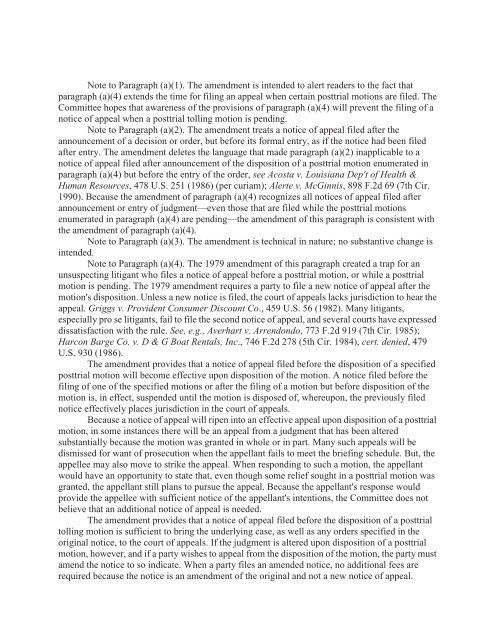Federal Rules of Appellate Procedure 2014-2015, 2014a
Federal Rules of Appellate Procedure 2014-2015, 2014a
Federal Rules of Appellate Procedure 2014-2015, 2014a
Create successful ePaper yourself
Turn your PDF publications into a flip-book with our unique Google optimized e-Paper software.
Note to Paragraph (a)(1). The amendment is intended to alert readers to the fact that<br />
paragraph (a)(4) extends the time for filing an appeal when certain posttrial motions are filed. The<br />
Committee hopes that awareness <strong>of</strong> the provisions <strong>of</strong> paragraph (a)(4) will prevent the filing <strong>of</strong> a<br />
notice <strong>of</strong> appeal when a posttrial tolling motion is pending.<br />
Note to Paragraph (a)(2). The amendment treats a notice <strong>of</strong> appeal filed after the<br />
announcement <strong>of</strong> a decision or order, but before its formal entry, as if the notice had been filed<br />
after entry. The amendment deletes the language that made paragraph (a)(2) inapplicable to a<br />
notice <strong>of</strong> appeal filed after announcement <strong>of</strong> the disposition <strong>of</strong> a posttrial motion enumerated in<br />
paragraph (a)(4) but before the entry <strong>of</strong> the order, see Acosta v. Louisiana Dep't <strong>of</strong> Health &<br />
Human Resources, 478 U.S. 251 (1986) (per curiam); Alerte v. McGinnis, 898 F.2d 69 (7th Cir.<br />
1990). Because the amendment <strong>of</strong> paragraph (a)(4) recognizes all notices <strong>of</strong> appeal filed after<br />
announcement or entry <strong>of</strong> judgment—even those that are filed while the posttrial motions<br />
enumerated in paragraph (a)(4) are pending—the amendment <strong>of</strong> this paragraph is consistent with<br />
the amendment <strong>of</strong> paragraph (a)(4).<br />
Note to Paragraph (a)(3). The amendment is technical in nature; no substantive change is<br />
intended.<br />
Note to Paragraph (a)(4). The 1979 amendment <strong>of</strong> this paragraph created a trap for an<br />
unsuspecting litigant who files a notice <strong>of</strong> appeal before a posttrial motion, or while a posttrial<br />
motion is pending. The 1979 amendment requires a party to file a new notice <strong>of</strong> appeal after the<br />
motion's disposition. Unless a new notice is filed, the court <strong>of</strong> appeals lacks jurisdiction to hear the<br />
appeal. Griggs v. Provident Consumer Discount Co., 459 U.S. 56 (1982). Many litigants,<br />
especially pro se litigants, fail to file the second notice <strong>of</strong> appeal, and several courts have expressed<br />
dissatisfaction with the rule. See, e.g., Averhart v. Arrendondo, 773 F.2d 919 (7th Cir. 1985);<br />
Harcon Barge Co. v. D & G Boat Rentals, Inc., 746 F.2d 278 (5th Cir. 1984), cert. denied, 479<br />
U.S. 930 (1986).<br />
The amendment provides that a notice <strong>of</strong> appeal filed before the disposition <strong>of</strong> a specified<br />
posttrial motion will become effective upon disposition <strong>of</strong> the motion. A notice filed before the<br />
filing <strong>of</strong> one <strong>of</strong> the specified motions or after the filing <strong>of</strong> a motion but before disposition <strong>of</strong> the<br />
motion is, in effect, suspended until the motion is disposed <strong>of</strong>, whereupon, the previously filed<br />
notice effectively places jurisdiction in the court <strong>of</strong> appeals.<br />
Because a notice <strong>of</strong> appeal will ripen into an effective appeal upon disposition <strong>of</strong> a posttrial<br />
motion, in some instances there will be an appeal from a judgment that has been altered<br />
substantially because the motion was granted in whole or in part. Many such appeals will be<br />
dismissed for want <strong>of</strong> prosecution when the appellant fails to meet the briefing schedule. But, the<br />
appellee may also move to strike the appeal. When responding to such a motion, the appellant<br />
would have an opportunity to state that, even though some relief sought in a posttrial motion was<br />
granted, the appellant still plans to pursue the appeal. Because the appellant's response would<br />
provide the appellee with sufficient notice <strong>of</strong> the appellant's intentions, the Committee does not<br />
believe that an additional notice <strong>of</strong> appeal is needed.<br />
The amendment provides that a notice <strong>of</strong> appeal filed before the disposition <strong>of</strong> a posttrial<br />
tolling motion is sufficient to bring the underlying case, as well as any orders specified in the<br />
original notice, to the court <strong>of</strong> appeals. If the judgment is altered upon disposition <strong>of</strong> a posttrial<br />
motion, however, and if a party wishes to appeal from the disposition <strong>of</strong> the motion, the party must<br />
amend the notice to so indicate. When a party files an amended notice, no additional fees are<br />
required because the notice is an amendment <strong>of</strong> the original and not a new notice <strong>of</strong> appeal.


















